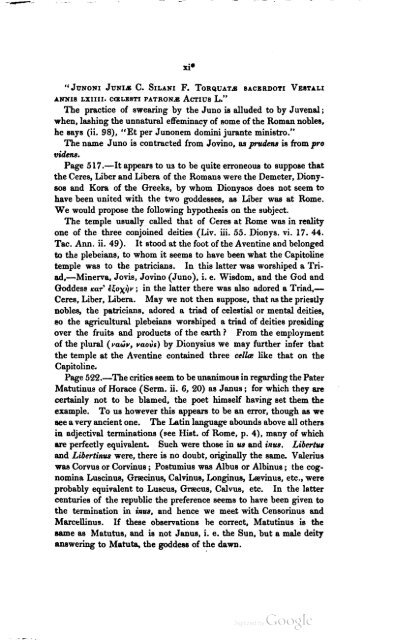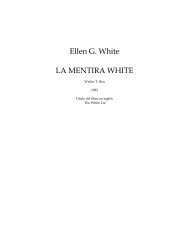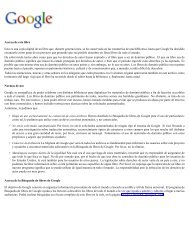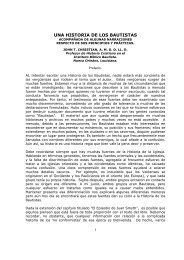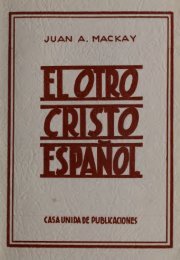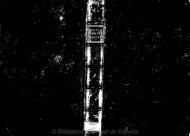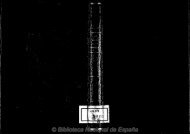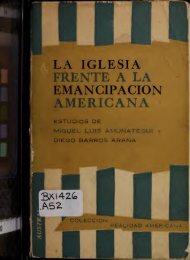- Page 1 and 2: Acerca de este libro Esta es una co
- Page 3 and 4: The mythology of ancient Greece and
- Page 7 and 8: %n ^-w-t-*^-*^^.
- Page 9: ^t^VnA^
- Page 12 and 13: THE PLATES ETCHED ON STEEL, By W. H
- Page 14 and 15: iv PREFACE. more confidence. It is
- Page 16 and 17: vi PREFACE. The subjects of the pla
- Page 18 and 19: viii PREFACE. proprietors, some of
- Page 20 and 21: X CONTENTS. CHAP. X. PALLAS-ATHENE
- Page 22 and 23: xii CONTENTS. CHAP. X. MYTHES OF EL
- Page 24 and 25: xiv PLATES. Plate V. 1. Aphrodite a
- Page 26 and 27: xvi REFERENCES. EDITIONS REFERRED T
- Page 30 and 31: xii* Page 526.—The obscurity in w
- Page 32 and 33: 2 MYTHOLOGY OF GREECE. its princes
- Page 34 and 35: 4 MYTHOLOGY OF GREECE. and the ligh
- Page 36 and 37: , MYTHOLOGY OF GREECE. pestilence i
- Page 38 and 39: 8 MYTHOLOGY OF GREECE. rose is ascr
- Page 40 and 41: 12 MYTHOLOGY OF GREECE. talis Comes
- Page 42 and 43: 14 MYTHOLOGY OP GREECE. to its true
- Page 44 and 45: 16 MYTHOLOGY OF GREECE. Chapter II.
- Page 46 and 47: 18 MYTHOLOGY OF GREECE. knowledge o
- Page 48 and 49: 20 MYTHOLOGY OF GREECE. mysteries c
- Page 50 and 51: 22 MYTHOLOGY OF GREECE. was the Sac
- Page 52 and 53: 21 MYTHOLOGY OF GREECE. of the Chur
- Page 54 and 55: 26 MYTHOLOGY OF GREECE. the Nature
- Page 56 and 57: 23 MTTHOLOGY OF GREECE. these were
- Page 58 and 59: 30 MYTHOLOGY OF GREECE. Violet-bed
- Page 60 and 61: 32 MYTHOLOGY OF GREECE. The Greeks
- Page 62 and 63: 34 MYTHOLOGY OF GREECE. the scenes
- Page 64 and 65: 30 MYTHOLOGY OF GREECE. In the time
- Page 66 and 67: 3S MYTHOLOGY OF GREECE. place to wh
- Page 68 and 69: 40 MYTHOLOGY OF GREECE. place of re
- Page 70 and 71: 42 MYTHOLOGY OF GREECE. and Hesiod
- Page 72 and 73: 4 4 MYTHOLOGY OF GREECE. Nereus had
- Page 74 and 75: 46 MYTHOLOGY OF GREECE. him. The Cy
- Page 76 and 77: 48 MYTHOLOGY OF GREECE. productive
- Page 78 and 79:
50 MYTHOLOGY OF GREECE. Chapter IV.
- Page 80 and 81:
52 MYTHOLOGY OF GREECE. This is all
- Page 82 and 83:
54 MYTHOLOGY OF GREECE. are told, i
- Page 84 and 85:
56 MYTHOLOGY OF GREECE. Neither Hom
- Page 86 and 87:
58 MYTHOLOGY OF GREECE. ance of bei
- Page 88 and 89:
60 MYTHOLOGY OF GREECE. 2eX?7v»;.
- Page 90 and 91:
62 MYTHOLOGY OF GREECE. In the Home
- Page 92:
64 MYTHOLOGY OF GREECE. described a
- Page 96 and 97:
66 MYTHOLOGY OF GREECE. others said
- Page 98 and 99:
68 MYTHOLOGY OF GREECE. Kpovo? kal
- Page 100 and 101:
70 MYTHOLOGY OF GREECE. mother coul
- Page 102 and 103:
12 MYTHOLOGY OF GREECE. Chapter V.
- Page 104 and 105:
74 MYTHOLOGY OF GREECE. pour forth
- Page 106 and 107:
76 MYTHOLOGY OF GREECE. purtenances
- Page 108 and 109:
78 MYTHOLOGY OF GREECE. Chapter VI.
- Page 110 and 111:
80 MYTHOLOGY OF GREECE. tised; Zeus
- Page 112 and 113:
82 MYTHOLOGY OF GREECE. we shall gi
- Page 114 and 115:
84 MYTHOLOGY OF GREECE. lightning,
- Page 116 and 117:
86 MYTHOLOGY OF GREECE. in their ni
- Page 118 and 119:
88 MYTHOLOGY OF GREECE. with the wa
- Page 120 and 121:
90 MYTHOLOGY OF GREECE. of the most
- Page 122 and 123:
92 MYTHOLOGY OF GREECE. dead who wa
- Page 124 and 125:
94 MYTHOLOGY OF GREECE. to conceal
- Page 126:
96 MYTHOLOGY OF GREECE. Chapter VII
- Page 130 and 131:
MYTHOLOGY OF GREECE. Ovid8 says tha
- Page 132 and 133:
100 MYTHOLOGY OF GREECE. bound to a
- Page 134 and 135:
102 MYTHOLOGY OF GREECE. as also we
- Page 136 and 137:
104 MYTHOLOGY OF GREECE. By Homer a
- Page 138 and 139:
10G MYTHOLOGY OF GREECE. Odyssey wh
- Page 140 and 141:
108 MYTHOLOGY OF GREECE. Hera alone
- Page 142 and 143:
110 MYTHOLOGY OF GREECE. The artist
- Page 144 and 145:
112 MYTHOLOGY OF GREECE. Chapter VI
- Page 146 and 147:
114 MYTHOLOGY OF GREECE. ascribed t
- Page 148 and 149:
116 MYTHOLOGY OF GREECE. In the Hom
- Page 150 and 151:
118 MYTHOLOGY OF GREECE. cian liter
- Page 152 and 153:
120 MYTHOLOGY OF GREECE. for hersel
- Page 154 and 155:
122 MYTHOLOGY OF GREECE. eighth yea
- Page 156 and 157:
124 MYTHOLOGY OF GREECE. Hence, to
- Page 158 and 159:
126 MYTHOLOGY OF OREECE. shines and
- Page 160:
128 MYTHOLOGY OF GREECE. be identic
- Page 164 and 165:
130 MYTHOLOGY OF GREECE. the huntre
- Page 166 and 167:
132 MYTHOLOGY OF GREECE. to drive a
- Page 168 and 169:
134 MYTHOLOGY OF GREECE. number, an
- Page 170 and 171:
136 • MYTHOLOGY OF GREECE. The ch
- Page 172 and 173:
138 MYTHOLOGY OF GREECE. be looked
- Page 174 and 175:
140 MYTHOLOGY OF GREECE. sembly of
- Page 176 and 177:
142 MYTHOLOGY OF GREECE. dite8, was
- Page 178:
144 MYTHOLOGY OF GREECE. of grief f
- Page 182 and 183:
14G MYTHOLOGY OF GREECE. "Epo?, "Ep
- Page 184 and 185:
148 MYTHOLOGY OF GREECE. who was ju
- Page 186 and 187:
150 MYTHOLOGY OF GREECE. the rock o
- Page 188 and 189:
152 MYTHOLOGY OF GREECE. The interp
- Page 190 and 191:
154 MYTHOLOGY OF GREECE. Pallas-Ath
- Page 192 and 193:
156 MYTHOLOGY OF GREECE. with them,
- Page 194 and 195:
158 MYTHOLOGY OF GREECE. any other
- Page 196:
160 MYTHOLOGY OF GREECE. mortals. T
- Page 200 and 201:
162 MYTHOLOGY OF GREECE. he slunk h
- Page 202 and 203:
164 MYTHOLOGY OF GREECE. her, singi
- Page 204 and 205:
1C6 MYTHOLOGY OF GREECE. footpaths,
- Page 206 and 207:
168 MYTHOLOGY OF GREECE. the cattle
- Page 208 and 209:
MYTHOLOGY OF GREECE. Chapter XI. DE
- Page 210 and 211:
172 MYTHOLOGY OF GREECE. away to be
- Page 212 and 213:
174 MYTHOLOGY OF GREECE. In the mor
- Page 214 and 215:
176 MYTHOLOGY OF GREECE. were added
- Page 216 and 217:
MYTHOLOGY OF GREECE. tinually follo
- Page 218 and 219:
180 MYTHOLOGY OF GREECE. 2. Terribl
- Page 220 and 221:
182 MYTHOLOGY OF GREECE. the worshi
- Page 222 and 223:
184 MYTHOLOGY OF GREECE. person was
- Page 224 and 225:
186 MYTHOLOGY OF GREECE. Later ages
- Page 226 and 227:
188 MYTHOLOGY OF GREECE. back, and
- Page 228 and 229:
190 MYTHOLOGY OF GREECE. almost eve
- Page 230 and 231:
192 MYTHOLOGY OF GREECE. Xoptre?. G
- Page 232 and 233:
194 MYTHOLOGY OF GREECE. Eileithyia
- Page 234 and 235:
196 MYTHOLOGY OF GREECE. Night and
- Page 236 and 237:
198 MYTHOLOGY OF GREECE. Chapter XI
- Page 238 and 239:
200 MYTHOLOGY OF GREECE. which suit
- Page 240 and 241:
202 MYTHOLOGY OF GREECE. Ne/i€
- Page 242 and 243:
204 MYTHOLOGY OF GREECE. and flung
- Page 244 and 245:
206 MYTHOLOGY OF GREECE. where Diom
- Page 246:
208 MYTHOLOGY OF GREECE. on board ;
- Page 250 and 251:
210 MYTHOLOGY OF GREECE. the introd
- Page 252 and 253:
212 MYTHOLOGY OF GREECE. thence too
- Page 254 and 255:
214 MYTHOLOGY OF GREECE. Dionysos n
- Page 256:
216 MYTHOLOGY OF GREECE. Bacche .'
- Page 260 and 261:
218 MYTHOLOGY OF GREECE. his festiv
- Page 262 and 263:
220 MYTHOLOGY OF GREECE. Chapter XV
- Page 264 and 265:
222 MYTHOLOGY OF GREECE. Affairs, a
- Page 266 and 267:
224 MYTHOLOGY OF GREECE. When she g
- Page 268 and 269:
226 MYTHOLOGY OF GREECE. "Aprefw; i
- Page 270 and 271:
228 MYTHOLOGY OF GREECE. be his ave
- Page 272 and 273:
230 MYTHOLOGY OF GREECE. The worshi
- Page 274:
232 MYTHOLOGY OF GREECE. The god of
- Page 278 and 279:
234 MYTHOLOGY OF GREECE. the festiv
- Page 280 and 281:
236 MYTHOLOGY OF GREECE. not—as i
- Page 282 and 283:
238 MYTHOLOGY OF GREECE. the potent
- Page 284 and 285:
240 MYTHOLOGY OF GREECE. "The schol
- Page 286 and 287:
242 MYTHOLOGY OF GREECE. course awk
- Page 288 and 289:
244 MYTHOLOGY OF GREECE. Chapter XV
- Page 290 and 291:
246 MYTHOLOGY OF GREECE. poets made
- Page 292 and 293:
248 MYTHOLOGY OF GREECE. symbol of
- Page 294 and 295:
250 MYTHOLOGY OF GREECE. Horafioi.
- Page 296 and 297:
252 MYTHOLOGY OF GREECE. poets, led
- Page 298 and 299:
254 MYTHOLOGY OF GREECE. only perso
- Page 300 and 301:
256 MYTHOLOGY OF GREECE. the destru
- Page 302 and 303:
258 MYTHOLOGY OF GREECE. west are t
- Page 304 and 305:
260 MYTHOLOGY OF GREECE. stitutions
- Page 306 and 307:
262 MYTHOLOGY OF GREECE. be shown i
- Page 308 and 309:
264 MYTHOLOGY OF GREECE. joy and fe
- Page 310 and 311:
26fi MYTHOLOGY OF GREECE. Sicily8.
- Page 312 and 313:
2C8 MYTHOLOGY OF GREECE. over all t
- Page 314 and 315:
270 MYTHOLOGY OF GREECE. on a rock
- Page 316 and 317:
272 MYTHOLOGY OF GREECE. vine Chary
- Page 318 and 319:
274 MYTHOLOGY OF GREECE. digies ; f
- Page 320 and 321:
276 MYTHOLOGY OF GREECE. who appear
- Page 322 and 323:
278 MYTHOLOGY OF GREECE. thing of e
- Page 324 and 325:
280 MYTHOLOGY OF GREECE. we wish no
- Page 326 and 327:
282 MYTHOLOGY OF GREECE. fragrance,
- Page 328 and 329:
284 MYTHOLOGY OF GREECE. up to heav
- Page 330 and 331:
286 MYTHOLOGY OF GREECE. position,
- Page 332 and 333:
288 MYTHOLOGY OF GREECE. cult to av
- Page 334 and 335:
290 MYTHOLOGY OF GREECE. that fed o
- Page 336 and 337:
292 MYTHOLOGY OF GREECE. When Prome
- Page 338 and 339:
294 MYTHOLOGY OF GREECE. about its
- Page 340 and 341:
29(3 MYTHOLOGY OF GREECE. the love
- Page 342 and 343:
298 MYTHOLOGY OF GREECE. and even u
- Page 344 and 345:
300 MYTHOLOGY OF GREECE. of that co
- Page 346 and 347:
302 MYTHOLOGY OF GREECE. Thesprotia
- Page 348 and 349:
304 MYTHOLOGY OF GREECE. to these w
- Page 350 and 351:
306 MYTHOLOGY OF GREECE. Chapter II
- Page 352 and 353:
308 MYTHOLOGY OF GREECE. nised. On
- Page 354 and 355:
310 MYTHOLOGY OF GREECE. Pelias had
- Page 356 and 357:
MYTHOLOGY OF GREECE. in which there
- Page 358 and 359:
314 MYTHOLOGY OF GREECE. groom a; C
- Page 360 and 361:
316 MYTHOLOGY OF GREECE. for we sho
- Page 362 and 363:
318 MYTHOLOGY OF GREECE. of Kronos
- Page 364 and 365:
320 MYTHOLOGY OF GREECE. Chapter II
- Page 366 and 367:
322 MYTHOLOGY OF GREECE. ties to th
- Page 368 and 369:
324 MYTHOLOGY OF GREECE. to resentm
- Page 370 and 371:
3 26 MYTHOLOGY OF GREECE. She went
- Page 372 and 373:
328 MYTHOLOGY OK GREECE. of that ch
- Page 374 and 375:
330 MYTHOLOGY OF GREECE. Peneios, a
- Page 376 and 377:
3.32 MYTHOLOGY OF GREECE. rene, and
- Page 378 and 379:
334 MYTHOLOGY OF GREECE. kept up an
- Page 380:
336 MYTHOLOGY OF GREECE. lydoros th
- Page 384 and 385:
338 MYTHOLOGY OF GREECE. Tone-full,
- Page 386 and 387:
310 MYTHOLOGY OF GREECE. A«io?. Lo
- Page 388 and 389:
342 MYTHOLOGY OF GREECE. foot after
- Page 390 and 391:
344 MYTHOLOGY OF GREECE. nymph Char
- Page 392 and 393:
346 MYTHOLOGY OF GREECE. tained the
- Page 394 and 395:
348 MYTHOLOGY OP GREECE. married, a
- Page 396 and 397:
350 MYTHOLOGY OF GREECE. ture, and
- Page 398 and 399:
352 MYTHOLOGY OF GREECE. cause of t
- Page 400 and 401:
354 MYTHOLOGY OF GREECE. was suffoc
- Page 402 and 403:
35(5 MYTHOLOGY OF GREECE. ing at th
- Page 404 and 405:
358 MYTHOLOGY OF GREECE. tomb of Ab
- Page 406 and 407:
360 MYTHOLOGY OF GREECE. Being scor
- Page 408 and 409:
362 MYTHOLOGY OF GREECE. been affli
- Page 410 and 411:
364 MYTHOLOGY OF GREECE. The hero h
- Page 412 and 413:
MYTHOLOGY OF GREECE. ravaged Cds, h
- Page 414 and 415:
36S MYTHOLOGY OF GREECE. the city o
- Page 416 and 417:
370 MYTHOLOGY OF GREECE. and being
- Page 418 and 419:
372 MYTHOLOGY OF GREECE. men, desce
- Page 420 and 421:
374 MYTHOLOGY OF GREECE. earth), cl
- Page 422 and 423:
376 MYTHOLOGY OF GREECE. Sals in Lo
- Page 424 and 425:
378 MYTHOLOGY OF GREECE. Kpavaos. C
- Page 426 and 427:
380 MYTHOLOGY OF GREECE. vering the
- Page 428 and 429:
382 MYTHOLOGY OF GREECE. tracted by
- Page 430 and 431:
384 MYTHOLOGY OF GREECE. Here we fi
- Page 432 and 433:
386 MYTHOLOGY OF GREECE. he receive
- Page 434 and 435:
388 MYTHOLOGY OF GREECE. to punish
- Page 436 and 437:
390 MYTHOLOGY OF GREECE. tarily off
- Page 438 and 439:
392 MYTHOLOGY OF GREECE. Theseus wa
- Page 440 and 441:
394 MYTHOLOGY OF GREECE. the fall.
- Page 442 and 443:
396 MYTHOLOGY OF GREECE. Peloponnes
- Page 444 and 445:
MYTHOLOGY OF GREECE. AalSaXos koX "
- Page 446 and 447:
400 MYTHOLOGY OF GREECE. charged hi
- Page 448 and 449:
402 MYTHOLOGY OF GREECE. the virtuo
- Page 450 and 451:
404 MYTHOLOGY OF GREECE. cord with
- Page 452 and 453:
40C MYTHOLOGY OF GREECE. principal
- Page 454:
408 MYTHOLOGY OF GREECE. firmation
- Page 458 and 459:
410 MYTHOLOGY OF GREECE. The countr
- Page 460 and 461:
412 MYTHOLOGY OF GREECE. the person
- Page 462 and 463:
414 MYTHOLOGY OF GREECE. with lepro
- Page 464 and 465:
416 MYTHOLOGY OF GREECE. dusa as it
- Page 466 and 467:
418 MYTHOLOGY OF GREECE. the sea-we
- Page 468 and 469:
420 MYTHOLOGY OF GREECE. forms a pa
- Page 470 and 471:
422 MYTHOLOGY OF GREECE. tryon, put
- Page 472 and 473:
424 MYTHOLOGY OF GREECE. Chapter VI
- Page 474 and 475:
426 MYTHOLOGY OF GREECE. afterwards
- Page 476 and 477:
428 MYTHOLOGY OF GREECE. their head
- Page 478 and 479:
430 MYTHOLOGY OF GREECE. who had lo
- Page 480 and 481:
432 MYTHOLOGY OF GREECE. honours of
- Page 482 and 483:
434 MYTHOLOGY OP GREECE. Chapter X.
- Page 484 and 485:
43G MYTHOLOGY OF GREECE. answering
- Page 486 and 487:
438 MYTHOLOGY OF GREECE. "lafxos. I
- Page 488 and 489:
440 MYTHOLOGY OF GREECE. was origin
- Page 490 and 491:
412 MYTHOLOGY OF GREECE. TavraXo?.
- Page 492 and 493:
444 MYTHOLOGY OF GREECE. gods, they
- Page 494 and 495:
4iG MYTHOLOGY OF GREECE. of the who
- Page 496 and 497:
448 MYTHOLOGY OF GREECE. but the re
- Page 498 and 499:
450 MYTHOLOGY OF GREECE. probably t
- Page 500 and 501:
452 MYTHOLOGY OF GREECE. for relief
- Page 502 and 503:
454 MYTHOLOGY OF GREECE. Chapter XI
- Page 504 and 505:
456 MYTHOLOGY OF GREECE. cording to
- Page 506 and 507:
458 MYTHOLOGY OF GREECE. In the The
- Page 508 and 509:
460 MYTHOLOGY OF GREECE. dren, migh
- Page 510 and 511:
462 MYTHOLOGY OF GREECE. beauty are
- Page 512 and 513:
464 MYTHOLOGY OF GREECE. IlXetaSe?
- Page 514 and 515:
466 MYTHOLOGY OF GREECE. are someti
- Page 516 and 517:
408 MYTHOLOGY OF GREECE. Chapter XI
- Page 518 and 519:
470 MYTHOLOGY OF GREECE. Dolionians
- Page 520 and 521:
472 MYTHOLOGY OF GREECE. was in the
- Page 522 and 523:
4>4 MYTHOLOGY OF GREECE. the island
- Page 524 and 525:
4?6 MYTHOLOGY OF GREECE. Libya, and
- Page 526 and 527:
478 MYTHOLOGY OF GREECE. Tydeus, an
- Page 528 and 529:
480 MYTHOLOGY OF GREECE. Bato, were
- Page 530 and 531:
482 MYTHOLOGY OF GREECE. of three o
- Page 532 and 533:
484 MYTHOLOGY OF GREECE. lestial st
- Page 534 and 535:
486 MYTHOLOGY OF GREECE. Aphrodite
- Page 536 and 537:
488 MYTHOLOGY OF GREECE. surroundin
- Page 538 and 539:
490 MYTHOLOGY OF GREECE. marries He
- Page 540 and 541:
492 MYTHOLOGY OF GREECE. Cassandra
- Page 542 and 543:
491 MYTHOLOGY OF GREECE. that Paris
- Page 544 and 545:
496 MYTHOLOGY OF GREECE. to the tak
- Page 546 and 547:
498 MYTHOLOGY OF GREECE. war. Again
- Page 549 and 550:
MYTHOLOGY OF ITALY. Chapter I. INTR
- Page 551 and 552:
EARLY STATE OF ITALY AND ROME. 503
- Page 553 and 554:
LATIN RELIGION. 505 casting the lig
- Page 555 and 556:
ITALIAN RELIGION. 507 turnus and Lu
- Page 557 and 558:
JOVIS, JUPPITER, JUPITER. 509 Chapt
- Page 559 and 560:
JUNO. 511 Pistor, whose altar was o
- Page 563 and 564:
VESTA. 513 care8. She was the deity
- Page 565 and 566:
VENUS. 515 field ; the swains all f
- Page 567 and 568:
LIBER. 517 Liber. The name of the a
- Page 569 and 570:
APOLLO. HAMERS, MAYORS, MARS. 519 A
- Page 571 and 572:
DIANA. JANUS. 521 cessor ; and he a
- Page 573 and 574:
JANUS. SATURNUS. 523 simple origin
- Page 575 and 576:
OPS. TEI-LUS. GENIUS. 525 Good Godd
- Page 577 and 578:
ORCUS, DITIS OR DIS. SOL AND LUNA.
- Page 579 and 580:
CONSUS. LAVERNA. 529 temple were so
- Page 581 and 582:
SUMMANUS, VEJOVIS, SORANUS. 531 asc
- Page 583 and 584:
MATUTA, AURORA. FORTUNA. BONUS EVEN
- Page 585 and 586:
TERMINUS. 535 another account says,
- Page 587 and 588:
FAUNUS. LUPERCUS. INUU8. 537 prayer
- Page 589 and 590:
POMONA. FLORA. 539 the rustics leap
- Page 591 and 592:
VACUNA. MABICA. name is now hardly
- Page 593 and 594:
LARS. 545 were hung on them, and of
- Page 595 and 596:
APPENDIX. A. Page 34. The Hyperbore
- Page 597 and 598:
APPENDIX. 549 akin to ydXa, yaXaier
- Page 599 and 600:
APPENDIX. 551 'Au^poaltf is plainly
- Page 601 and 602:
APPENDIX. 553 embassy. Why should h
- Page 603 and 604:
APPENDIX. 555 OiS' av reXeias xpvai
- Page 605 and 606:
INDEX OF NAMES. *** The Latin Names
- Page 607 and 608:
Daedalos, 398, 456 Damastes, 388 Da
- Page 609 and 610:
Lichas, 369 Licymnios, 421 Ligeia,
- Page 611 and 612:
Quingudtrus, 513 Quirlnus, 528 Rhad
- Page 613 and 614:
WORKS BY THE SAME AUTHOR. HISTORIES
- Page 615 and 616:
WORKS BY THE SAME AUTHOR. VIII. In
- Page 619:
Top. .' ' C-MIMAO 1001179180


